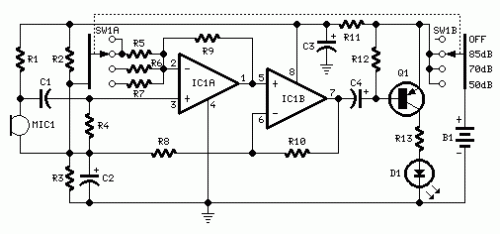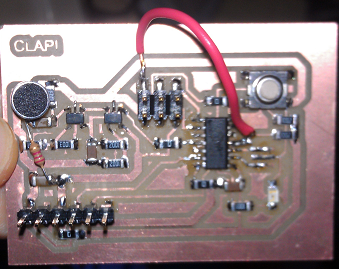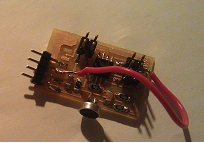I
have always wanted to do a "Clap-on, Claff-off" device to allow me to
turn on and off device though a hand clap. I found the following
circuit which generates a digital signal. If a loud noise is
made, the output is high, otherwise is low. I wanted to do some
of the process in analog circuitry because I wasn't sure if the
microprocessor could sample fast enough and buffer the signals.
After
stuffing the board. I was able to use a scope to validate the result of
the circuit. I had to add a resistor between the power and the
microphone as per the DigirKey suggested circuit. After milling
the board twice (due to uneven surface), I had a stuffed board:
I
spent over 5 hours trying to connect to the board and to make fuse.
I was able to make a .hex file but received the -rc error when I
tried to make fuse. I checked the hardware to ensure there's no
short, as well as to ensure that the microproessor was properly
powered. I decided to make the microphone board given in
class as a backup. I was able to communicate with it (nice that
it didn't need a fuse), but because the IDC shope was out of flat 0.1
connector, I used the right angled one for the 6-pin connector used to
get power and communicate with the computer. This ended up
shorting the power and ground. I discovered this after some more
time debugging the hardware. I de-solder the connector off, but
not before ripping out some pads. After some surgery work and
using a spare 4-pin connector I found lying around, I had the
following:
I used Lindy's
wonderful tutorial to progrma the board and was able to create a .hex
file and download it onto the controller. However, because the
6-pin connector is missing one of the pin for serial communication, I
couldn't get data on the Python code. I will have to find a new
connector and re-solder it.
In conclusion, this week was many
hours in the shop making and debugging hardware, and trying to work
with the software. The positive side is that I got a lot of
practice in debugging hardware and am getting familiar with the
procedure of programming the ATTINY44. Hopefully with a new board
with the issues fixed, I will be able to have my clapper board.



